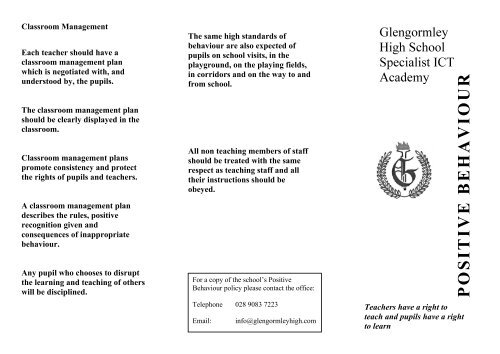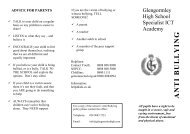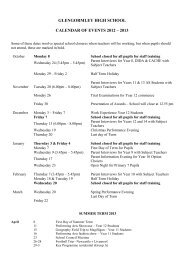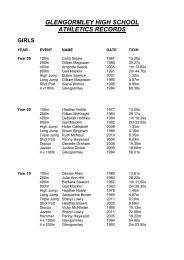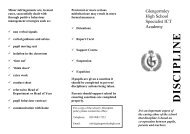Positive Behaviour policy summary - Glengormley High School
Positive Behaviour policy summary - Glengormley High School
Positive Behaviour policy summary - Glengormley High School
Create successful ePaper yourself
Turn your PDF publications into a flip-book with our unique Google optimized e-Paper software.
Classroom Management<br />
Each teacher should have a<br />
classroom management plan<br />
which is negotiated with, and<br />
understood by, the pupils.<br />
The classroom management plan<br />
should be clearly displayed in the<br />
classroom.<br />
Classroom management plans<br />
promote consistency and protect<br />
the rights of pupils and teachers.<br />
A classroom management plan<br />
describes the rules, positive<br />
recognition given and<br />
consequences of inappropriate<br />
behaviour.<br />
Any pupil who chooses to disrupt<br />
the learning and teaching of others<br />
will be disciplined.<br />
The same high standards of<br />
behaviour are also expected of<br />
pupils on school visits, in the<br />
playground, on the playing fields,<br />
in corridors and on the way to and<br />
from school.<br />
All non teaching members of staff<br />
should be treated with the same<br />
respect as teaching staff and all<br />
their instructions should be<br />
obeyed.<br />
For a copy of the school’s <strong>Positive</strong><br />
<strong>Behaviour</strong> <strong>policy</strong> please contact the office:<br />
Telephone 028 9083 7223<br />
Email:<br />
info@glengormleyhigh.com<br />
POSITIVE BEHAVIOUR<br />
Teachers have a right to<br />
teach and pupils have a right<br />
to learn
Aims<br />
To promote learning for all<br />
pupils<br />
To make it easier for teachers<br />
to teach effectively<br />
To enhance the pupils’ self<br />
esteem and foster self respect<br />
and respect for others<br />
To encourage the pupils to<br />
develop independence and self<br />
discipline by taking<br />
responsibility for their own<br />
behaviour<br />
To develop the pupils’<br />
interpersonal skills and their<br />
ability to work with others<br />
To promote positive<br />
relationships between pupils<br />
and staff<br />
To ensure consistency in terms<br />
of behaviour and how poor<br />
behaviour is dealt with<br />
Pupils have a responsibility to:<br />
Carry a school bag<br />
Carry a homework diary<br />
Arrive on time for each class,<br />
properly prepared for the<br />
lesson<br />
Listen when the teacher is<br />
talking<br />
Follow teacher instructions<br />
If necessary, request<br />
permission to leave a class<br />
Keep on task<br />
Work quietly and avoid<br />
distracting others<br />
Use appropriate language<br />
Pupils whose conduct and work<br />
are commendable are openly<br />
praised and encouraged.<br />
A variety of rewards are used to<br />
recognise good work and<br />
behaviour.<br />
Examples of inappropriate<br />
behaviour include:<br />
Bullying<br />
Throwing bottles, cans and<br />
cartons of lemonade or juice<br />
Eating, chewing gum<br />
‘Drumming’, whistling<br />
Gambling<br />
Graffiti/disfiguring books or<br />
school property<br />
Abusing others’ property<br />
Use of mobile phones, personal<br />
music players, cameras,<br />
recording devices<br />
Smoking, use or possession of<br />
drugs or alcohol<br />
Abusive/offensive language<br />
Threatening behaviour (verbal<br />
and body language), violence


